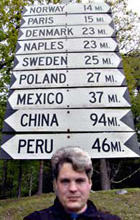Subscribe to the blog 
|
 |
 |
 |
 |
 |
Find a Flight Consider a Consolidator Rent a Car Pick a Railpass Book a Vacation Reserve a Room Get Gear |
|
||||||
|
Pronto
Soccorso
27 May 1998 I think I shall revise my maxim about what one must see, beyond the sights, to really experience a country. Before it was just to eat the cuisine (naturally) and to watch some local TV. Recently, I've added shop in the local market and/or K-Mart equivalent. However, I am increasingly of the opinion that to this list we must add one other activity without which no country experience is complete: a visit to the emergency room of the local hospital. Now of course I don't mean a visit for drastic reasons requiring an ambulance and IV drip. I mean relatively minor yet still annoying ailments, such as Frances' flu on that rainy night in Rome, or the vicious Scottish germs I waged a bedridden battle against on Santorini. Or, of course, Jay's recurrent sinusitus that's been worsening over the past few days. So after a lengthy walk through some of the more bombed-out sections of Palermo (I know of no other European city that still has whole blocks of broken and charred buildings destroyed in World War II still rotting in the very center of town), down city streets that have become dirt roads, back and forth and in spiraling circles as we got repeatedly lost, and then across several dusty, wind-swept squares, we finally stumbled across Palermo's Ospedale Civico. We went into the Pronto Soccorso (first aid, or emergency room) wing, where we read a huge sign on the wall instructing non-EU nationals seeking care to go to the "Ticket Office" (sic) down the hall and around the corner. At the Ticket Office, they seemed boggled as to why we would have come to them, professed to know nothing about the large, multilingual sign regarding their services that dominated the emergency room, and sent us back to Pronto Soccorso. While waiting in line, we noticed that the symbol for "Emergency Room/First Aid" is a green circle with a hand inside it and the international medical Greek cross superimposed in the middle of the hand. The hand, however, had only the stub of an index finger remaining. This did not bode well. The Pronto Soccorso people took Jay's name, I described his symptoms as best I could (not knowing much medical terminology in Italian), and they tore out a sheet of paper for us that had Otonoria (or something like that) checked off, telling us to proceed to that department. They sent us scurrying down a tree-lined boulevard past broken-down hospital buildings that were sporadically signposted as to what was inside each (interestingly, the ward for "ambulatory rehabilitation" was in a building way at the end of the road at the top of a steep flight of stairs). By asking around, we finally got pointed toward the building with the mysterious Otonoria in it (no sign, though), and we entered. The dimly lit halls were semi-empty, but occasionally a doctor-type in the requisite white coat would rush out from some door and duck quickly into another. We asked again about Otonoria and were told "primo piano," first floor. The elevator was out of service, and I only mention this because the stairs were half-filled with scaffolding as well (ospedale chiuso per restauro?). At the top of the stairs was a room edged with tiny plastic chairs atop which perched the members of what appeared to be several extended families that looked as if they'd been waiting since 1952. They sat there, unblinking, like refugees from a Fellini movie, the men in old wool suits the women swaddled in black shawls, the kids in forth generation hand-me-down oversized button-down shirts and grubby overly short corduroy pants. None of them was showing any sign of life. I resisted the urge to check for cobwebs. The rooms also featured two, unmarked doors. We tried one, it was locked, so I knocked. It opened a crack and I could see and hand on the knob and a bit of red sleeve. I asked "Otonoria?" and the hand responded "L'altra porta" (the other door) before quickly pulling the door shut. We knocked on the other door and it clicked open on its own, we poked our heads inside and saw two female nurses down a short hall, one chatting on the phone. "Otonoria?" The blonde waved us in. more >> |

